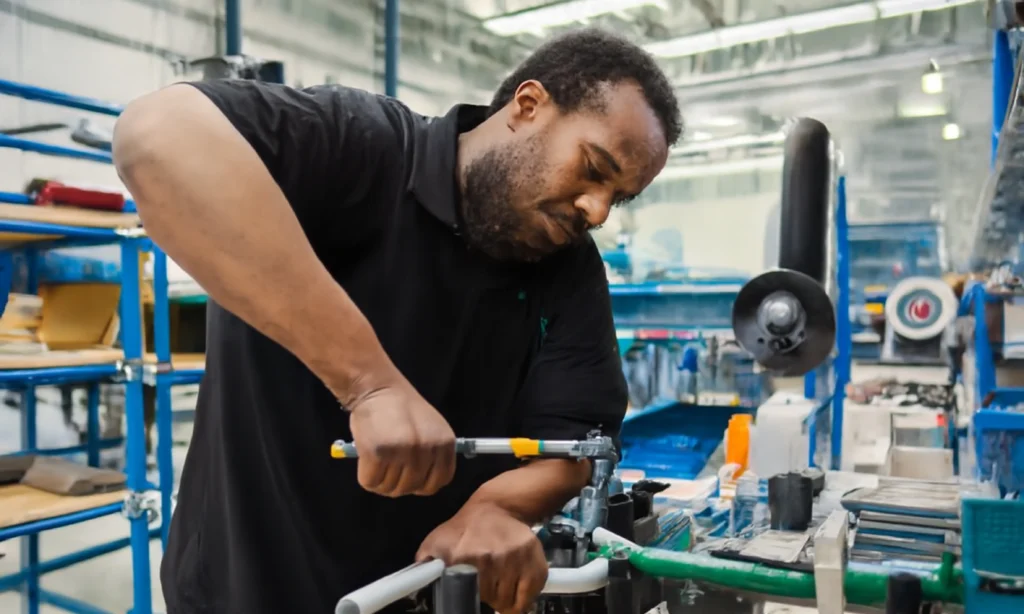Even with no previous experience, factory work in Greece is a great way to get into the manufacturing sector of the country which is on a rise. The Greek job market is waiting with a great opportunity to take a rewarding job that will be stable, help you develop your skills, and have a chance to build a career in one of the most culturally diverse countries in Europe with the right approach, preparations, and knowledge of the Greek job market.
The manufacturing sector in Greece is wide with a variety of industries such as food processing and textiles, automotive parts and electronics. Entry-level jobs are also open to job seekers of all backgrounds since many employers are keen on recruiting them and offering them extensive training programs.
This guide will take you through what you need to do to get a factory work job in Greece including what is required of you, the application process and how you can succeed in your new job in Greece.
Understanding Greece’s Manufacturing Landscape
The manufacturing sector in Greece has been growing tremendously over the past years due to the economic recovery and the rise of foreign investments. The strategic position of the country in between Europe, Asia and Africa makes it a desirable location in terms of production and distribution activities.
Key Manufacturing Industries
Food and Beverage Processing: The food processing industry is well developed in Greece due to the agricultural abundance. The companies manufacture olive oil, dairy products, wine, and packaged foods, both as domestic consumption and export. Such plants usually employ temporary employees at the time of high production.
Textile and Clothing: The textile industry is still well developed in Greece, and there are factories that manufacture clothes, fabrics, and home textiles. Most facilities have entry-level jobs and the chance to get promoted to a more specialized job.
Automobile Parts: There are a number of foreign auto manufacturers who have set up production factories in Greece, supplying parts to the large car manufacturers. The facilities usually provide good benefits and steady employment.
Electronics and Technology: Greece has the manufacturing facilities of electronics, telecommunications equipment and consumer products. Such modern plants usually have good training programs to new employees.
Construction Materials: The development in the construction business has led to more demand of building materials which offers opportunities in cement factories, steel factories and other building material manufacturing factories.
Entry-Level Factory Job Requirements
Physical Requirements
Majority of the jobs in the factories demand minimum physical fitness. Employees are required to stand most of the time, carry heavy materials of up to 50 pounds, and do monotonous tasks. There are some occupations that require working in temperature-controlled areas or use protective gear.
Basic Skills and Qualifications
Although a certain experience is not always required, the employers appreciate:
- Reliability and punctuality: The factory work relies on attendance and time keeping
- Basic mathematical knowledge: the knowledge of measurements, quantities and simple calculations
- Paying attention to detail: There are safety and quality control measures to be observed
- Teamwork skills: Factory work requires a person to work with fellow workers and supervisors
- Desire to learn: Employers like candidates who are willing to learn and to improve their skills
Language Requirements
English is a working language in many international firms that have established themselves in Greece and therefore jobs are open to English speaking job applicants. Nevertheless, knowing some simple Greek phrases connected with safety at work, the names of the equipment, and frequently used instructions will enhance your chances of getting a job and working experience greatly.
Work Authorization
Citizens of the EU are allowed to work in Greece without any extra permits. Workers outside the EU require proper work authorization, which employers usually assist in obtaining by qualified applicants, particularly in those industries with shortages of workers.
Finding Factory Worker Opportunities
Online Job Platforms
There are a number of sites devoted to Greek job advertisements:
Kariera.gr: The biggest job portal in Greece with a variety of manufacturing job opportunities of all levels of experience. The site gives you an opportunity to narrow down the search based on location, industry and experience requirements.
Indeed Greece: This global site contains local factory employment opportunities with specific information and the way to apply. There are numerous postings that explicitly state that they are seeking no experience or entry-level.
WorkInGreece.gr: Narrows down to the opportunities of foreign workers, such as factory jobs with training and assistance to the new workers.
XE.gr: Has job advertisements of large Greek employers, such as manufacturing firms that demand entry-level employees.
Recruitment Agencies
Special employment agencies may assist in providing you with a job that matches your skills and interests in the factory. These agencies are usually connected to big manufacturers and can guide you well through the application process.
Adecco Greece: Provides temporary and permanent placement in the manufacturing industry which is usually a precursor to full-time employment.
Manpower Greece: It deals with industrial staffing and often hires factory workers in different sectors.
Randstad Greece: Offers placement services of manufacturing positions and gives career development advice.
Direct Company Applications
Most of the large manufacturing firms have websites where one can apply directly even when there are no job offers. Do your homework, research major Greek manufacturers in your area of interest and apply proactively.
Make a list of prospective companies and visit their websites frequently to see the new openings. Other businesses have databases of candidates and they approach the right candidate when there is a vacancy.
Networking and Local Connections
Relationships in the Greek manufacturing society can result in employment avenues. Visit job fairs, become a member of professional associations, and associate with other workers in your field of interest.
Job placement services are also offered by local unemployment offices (OAED) and they might have news of factory openings in your area.
Preparing a Strong Application
Resume Development
Greek employers want well-written resumes that reflect your worth and potential, regardless of having any factory experience. Include:
Personal Information: Full contact information, phone number as well as email address where you will be checking regularly.
Education: Enlist all educational attainment such as high school diplomas, vocational education and any other related coursework.
Work Experience: List all your past jobs even without the experience at the factory. Focus on transferable skills such as teamwork, reliability, problem solving and follow instructions.
Skills and Abilities: Indicate the following capabilities, which are relevant:
- Fitness and endurance Physically
- Elementary computer literacy
- Experience of operating equipment (not necessarily industrial)
- Language proficiencies
- Courses or qualifications taken
References: Give the name and contact details of former bosses, educators or local leaders that can vouch on your character and work ethics.
Cover Letter Strategy
Write interesting cover letters that respond to the requirements stipulated in job advertisements. Emphasize:
- Your passion to acquire new skills and give to the company
- The reason you want to work in a factory and manufacturing
- Your adherence to safety and quality requirement
- Your readiness to work different shifts and overtime at the required moments
- Any experience that can illustrate reliability and teamwork
Application Timing
Apply as soon as possible when the jobs are posted. There are numerous jobs in the factory that are in demand, particularly entry-level jobs where training is offered. Contact the applications within a week and show your persistence and interest.
Interview Preparation and Success
Common Interview Questions
The factory job interviews are usually aimed to test your reliability, safety awareness and the capability to work in a team. Be ready to answer such questions as:
- Why do you want to work in the factory?
- What do you do with routine work?
- Tell me about an incident when you were required to work with instructions.
- What are your priorities with regard to safety at work?
- How would you respond in case you saw a problem with a product?
Demonstrating Your Value
You may also emphasise transferable skills in other spheres of life, even without factory experience:
- Reliability: Give instances of regular attendance in past employment, school or volunteering work
- Learning ability: Explain how you have learned new skills or processes very fast
- Group work: Exchange experiences of working with various groups of individuals
- Problem-solving: Describe how you have solved problems in the past job positions
Interview Presentation
Wear professional clothes and be early during interviews. Carry with you copies of your resume, identification papers and any other certificates or training records. Be interested in the opportunity and ask intelligent questions regarding the job and the company.
Succeeding in Your New Factory Role
Training and Skill Development
Majority of entry-level factory jobs involve a detailed training program that entails:
- Safety precautions: Learning about the hazards and defense in the workplace
- Operation of equipment: Acquiring skills on how to operate equipment in a safe way that is productive.
- Quality control: Detection of defects and quality of production: Quality control
- Procedures in the company: Adherence to certain procedures and documentation standards
Train seriously and inquire when you do not understand concepts. Show your intentions of learning by making notes and rehearsing new skills during breaks.
Building Relationships
Effective factory employees establish good contacts with fellow workers and managers. Treat everyone with respect, helpfulness and professionalism. Provide help where needed and be grateful to receive advice of more experienced workers.
Performance Excellence
Exceed expectations by:
- Coming in early and staying late when it is necessary
- Ensuring good quality in your job
- Adherence to safety procedures devoid of exceptions
- Giving recommendations where necessary
- Offering to take up more duties
Career Advancement
There are many chances of promotion in factory work. There are several positions that are offered by many companies through promotion:
- Supervisor or team leader job positions
- Quality control officer
- Technician of equipment maintenance
- Training coordinator
- Production planner
Show interest in promotion and take up more training when possible. Other employers provide tuition reimbursement to pertinent education or certification programs.
Living and Working in Greece
Cost of Living Considerations
The cost of living in Greece is relatively cheap as compared to other western European countries. The salary of factory workers is between 600 and 1,200 euros per month, depending on the industry, the location and the level of experience.
The prices of housing also differ greatly depending on the location, and smaller cities and rural areas are cheaper than Athens or Thessaloniki. A lot of factory workers can afford comfortable living conditions in their pay bracket.
Work Culture and Environment
The Greek work culture pays attention to relationships and respect. It is important to establish positive relationships with the fellow workers and bosses in order to achieve job satisfaction and career growth.
There are frequently several shifts in the factory, and during rush times, there is a possibility of overtime compensation. There are facilities that have flexible schedules to meet individual needs.
Benefits and Job Security
Most of the factory jobs in Greece have the following benefits:
- Health insurance cover
- Paid vacation time (20- 25days a year)
- Opportunities of overtime pay
- Performance bonuses
- Professional funding
Taking the Next Step
Good careers and personal growth opportunities are available to factory worker jobs in Greece even to those who are new and lack experience. The manufacturing industry in the country is expanding and provides employment security, attractive remuneration as well as the opportunity to develop valuable skills as you get to learn the Greek culture and way of life.
Begin your career by learning about companies in the field of your interest, assembling effective application packages, and showing your interest in learning and participating in manufacturing processes. By being patient and doing it the right way, you can land a satisfying factory job that will form a solid base to your successful career in Greece.
The need of quality, driven factory workers is increasing in various industries, and this is the best time to start your application process and make the first step towards your new career in Greek manufacturing.



